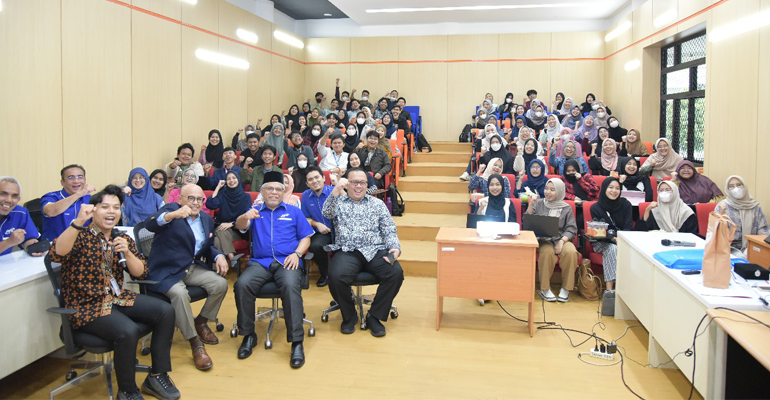Department of Sharia Economics Holds Public Lecture with Malaysian Zakat Collection Center

The Department of Sharia Economics, Faculty of Economics and Management (FEM) IPB University invited a delegation from the Center for Zakat Collection-Majlis Agama Islam Wilayah Persekutuan (PPZ-MAIWP) Malaysia to give a public lecture with students, 5/9.
PPZ-MAIWP Malaysia is a zakat institution responsible for collecting and managing zakat, infaq, sadaqah and waqf funds in the Malaysia Fellowship Area. This region consists of Kuala Lumpur, Putrajaya and Labuan.
Rector of IPB University, Prof Arif Satria welcomed the arrival of the PPZ-MAIWP delegates. In his speech he explained the programs and innovations owned by IPB University.
“Welcome to our campus, IPB University. IPB University has fostered 2000 villages in Indonesia through the One Village One CEO (OVOC) program. We foster farmers from production to marketing products that are the potential of the village and are carried out by students,” he said.
He continued, “We have also developed a village that produces compost derived from goat manure and currently the product has been supplied to 11 countries. So our main task as a university is to produce the best graduates and produce innovations that benefit the community,” he concluded.
In his lecture, the Chairman of the Zakat Collection Center (PPZ) Tan Sri Dato, Sri Dr Abdul Aziz Abdul Rahman presented material related to the Development of Zakat in Malaysia. He explained that PPZ has been developing zakat research for more than 21 years with the aim of educational jihad.
From 1991, he said, until 2022 the development of zakat in Malaysia has increased. By 2022 PPZ had collected more than 9.1 billion Malaysian ringgit in zakat.
“We also have a community of volunteers who are interested in learning with PPZ and currently there are five universities in Malaysia that participate in volunteer zakat. We have a program called Jihad Ekonomi: Urban Agriculture Program,” he said.
He explained that the program was carried out to build a synergistic network between PPZ-MAIWP and various parties, including universities. This also helps improve the economy of the local community and the results of this program will be sold commercially.
Another program presented was the Asnaf Mushroom Site. The program is implemented to allocate zakat through mushroom planting by zakat recipients (Asnaf).
“A total of RM 547,500 of zakat funds have been allocated to produce successful agricultural entrepreneurs. A total of 15 participants worked on the project with an allocated mushroom house with a capacity of 5 thousand mushroom blocks along with supporting equipment,” he explained. (Lp/ra) (IAAS/HAP)



